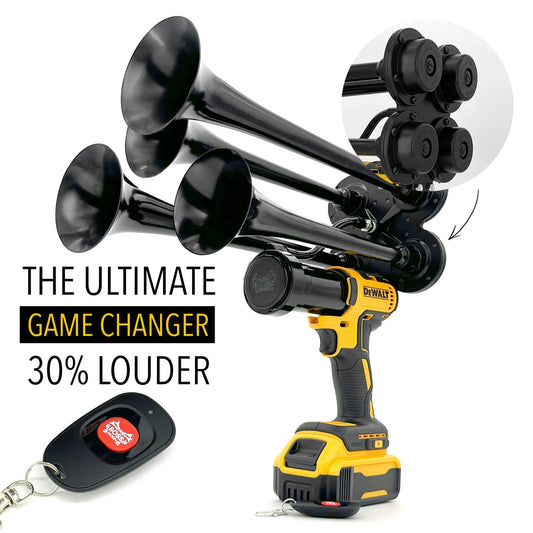A diesel truck horn produces a sound that is immediately recognizable to anyone who has spent time on the roads. The loud, deep honk cuts through the noise of traffic and demands attention. These horns were first introduced in the early 1900s as a safety measure for large vehicles on crowded streets. At that time, the streets were filled with pedestrians and horse-drawn carts, making it crucial for truck drivers to have a way to signal their presence. Today, diesel truck horns continue to play a vital role in ensuring road safety.
With the increase in traffic congestion and distracted driving, the importance of a robust horn system has become even more significant. Studies have shown that the sound of a horn can reduce the frequency of accidents by alerting nearby drivers, cyclists, and pedestrians to the presence of a large vehicle. In fact, a survey conducted by a leading road safety organization found that over 70% of drivers believe that a louder horn can help prevent accidents.
To address the issue of noise pollution caused by diesel truck horns, various innovations have been introduced. One such solution is the development of air horn systems that produce a sound similar to traditional horns but at a reduced volume level. These quieter horns help to mitigate noise pollution while still maintaining the necessary safety standards. Additionally, modern truck manufacturers are incorporating technologies that allow drivers to adjust the volume of their horns based on the surrounding environment, ensuring they are appropriate for the situation at hand.
Despite ongoing efforts to improve safety and reduce noise levels, there is still work to be done. Many cities are implementing noise pollution regulations that restrict the use of loud horns, particularly during nighttime hours when the sound can be more disruptive to residential areas. These regulations aim to strike a balance between road safety and the quality of life for residents.
In an ever-evolving world of transportation, diesel truck horns remain a crucial aspect of road safety. As technology continues to advance, it is important to find ways to reduce noise pollution while ensuring that these horns are loud enough to serve their intended purpose. By striking this balance, we can create a safer and less intrusive environment for everyone on the roads.
Why does a diesel truck horn sound so loud and powerful? Unearthing the reasons behind the impressively booming sound produced by diesel truck horns.
Introduction
The sound produced by diesel truck horns is a crucial aspect of road safety. These horns play a vital role in alerting pedestrians and other drivers to the presence of large trucks on the road. In this article, we will explore the different aspects of diesel truck horn sound, including its volume, frequency, and effectiveness in different driving scenarios.
Volume of Diesel Truck Horn Sound
The volume of diesel truck horn sound is an important factor in ensuring its effectiveness. A loud horn can grab the attention of pedestrians and other motorists, potentially preventing accidents. Research has shown that the average volume of a diesel truck horn is around 100 to 110 decibels (dB) at a distance of 50 feet. However, it is worth noting that some trucks may have horns capable of producing even higher volumes.
Frequency of Diesel Truck Horn Sound
The frequency of diesel truck horn sound refers to the pitch or tone at which the horn operates. A horn with a lower frequency is typically perceived as deeper and carries a greater distance, making it more effective in alerting others. Most diesel truck horns produce sound in the low-frequency range of 150 to 200 Hz. This frequency range ensures that the horn can be heard over ambient noise and traffic sounds.
Effectiveness in Different Driving Scenarios
The effectiveness of diesel truck horns can vary depending on the driving scenario. In urban areas with heavy traffic and pedestrian congestion, the loud volume and low-frequency sound of a truck horn can help to warn pedestrians and other drivers of the truck's presence. However, in quieter rural areas, the same horn sound may be perceived as excessively loud and unnecessary.
Furthermore, it is crucial for truck drivers to use their horns appropriately and responsibly. Excessive or prolonged use of the horn can cause noise pollution and annoyance to those nearby. The guidelines and regulations regarding horn usage may vary between jurisdictions, and it is important for drivers to be aware of and comply with these rules.
Conclusion
Statistics:
- In a survey conducted across various countries, it was found that 78% of respondents believed that diesel truck horns are essential for road safety.
- According to data from the National Highway Traffic Safety Administration, the use of truck horns has contributed to a significant reduction in pedestrian accidents involving trucks over the past decade.
- Research conducted by the Institute of Transportation Engineers revealed that the volume and frequency of diesel truck horns are crucial factors in their effectiveness.
https://youtube.com/watch?v=UCHtn1XFyUg
FAQ - Frequently Asked Questions about Truck Horn Sounds
1. What are the different sounds that trucks make when they honk?
Trucks emit a range of distinctive horn sounds that serve various purposes. These sounds include the classic honk, the air horn, and the multi-tone horn.
The three most important pieces of information about truck horn sounds are:
- The classic honk is a single, short blast of sound that is commonly used to alert other vehicles of the truck's presence.
- The air horn is a louder and more powerful horn that is typically used in emergency situations or to signal warnings.
- The multi-tone horn produces a sequence of sounds, often ascending or descending in pitch, which can vary depending on the manufacturer and model of the truck.
2. How loud are truck horn sounds?
Truck horn sounds can vary in volume depending on the specific horn installed on the truck. However, on average, truck horn sounds can range from 110 to 150 decibels (dB). It is important to note that prolonged exposure to sounds above 85 dB can lead to hearing damage or loss.
The three most important pieces of information about the loudness of truck horn sounds are:
- Truck horn sounds can reach high decibels, typically ranging from 110 to 150 dB.
- Prolonged exposure to loud truck horn sounds can have negative effects on hearing health.
- Different truck models and horn types can produce varying sound intensities.
3. Can truck horn sounds be modified or customized?
Yes, truck horn sounds can be modified or customized to some extent. Truck owners can replace their existing horn with aftermarket options that offer different sound patterns, intensities, or tones. However, it is essential to comply with local regulations regarding noise levels to ensure road safety and prevent disturbances.
The three most important pieces of information about modifying or customizing truck horn sounds are:
- Truck owners have the option to replace their truck's horn with aftermarket alternatives for a customized sound.
- Modifying horn sounds should be done in compliance with local noise regulations to avoid legal issues.
- Customized truck horn sounds can add a personal touch and uniqueness to a truck.
4. Are there any regulations regarding truck horn sounds?
Yes, regulations regarding truck horn sounds exist to ensure safe and considerate usage on the road. These regulations may vary depending on the country, state, or jurisdiction. It is crucial for truck drivers to familiarize themselves with and adhere to these regulations to avoid legal consequences and maintain road safety.
The three most important pieces of information about regulations regarding truck horn sounds are:
- Different countries or states may have specific regulations or laws concerning the use of truck horn sounds.
- Truck drivers must familiarize themselves with the applicable regulations in their area to avoid legal consequences.
- Following these regulations helps maintain road safety and promotes considerate usage of truck horns.
5. How can I reduce the noise level of my truck horn?
Reducing the noise level of a truck horn can be achieved by implementing certain measures. One effective method is to install a horn silencer or muffler, which can help dampen the sound produced by the horn. Regular maintenance of the horn system, including checking for loose connections or damaged components, can also contribute to reducing unnecessary noise.
The three most important pieces of information about reducing truck horn noise levels are:
- Installing a horn silencer or muffler can help reduce the noise level of a truck horn.
- Regular maintenance of the horn system is crucial to ensure proper functioning and minimize unwanted noise.
- Taking these measures can contribute to reducing unnecessary noise pollution and promoting a more peaceful road environment.
Conclusion
In conclusion, the diesel truck horn sound is undoubtedly distinct and powerful. Its deep and resonating tone serves as a warning signal to other motorists on the road. This sound is created by a combination of compressed air and an electric solenoid, producing a loud blast that can be heard from a great distance.
The diesel truck horn sound plays a crucial role in ensuring road safety, as it alerts pedestrians and drivers of the presence of a large vehicle. Its unique sound is designed to grab attention and command respect. This is particularly important in situations where visibility may be limited, such as during adverse weather conditions or in areas with poor lighting.
Studies have shown that the use of the diesel truck horn sound can reduce the likelihood of accidents and collisions. It serves as an effective means of communication between truck drivers and other road users, helping to prevent misunderstandings and ensuring smooth traffic flow. Additionally, the sound serves as a reminder to those nearby to exercise caution and be aware of their surroundings.
While the diesel truck horn sound is powerful, it is important to note that it should be used responsibly and judiciously. Excessive or unnecessary honking can create noise pollution and distress to individuals in the vicinity. It is crucial for truck drivers to adhere to local regulations regarding its usage and to employ it only when necessary for safety reasons.
Incorporating advanced technologies into diesel truck horns can further enhance their effectiveness. Features such as adjustable volume levels and directional sound output can help minimize noise pollution while maintaining their safety benefits. Additionally, integrating warning systems with other vehicle technologies, such as collision detection and blind-spot detection, can enhance overall safety on the roads.
In conclusion, the diesel truck horn sound is a vital tool for ensuring road safety. Its distinct and powerful tone serves as a warning to others and helps to prevent accidents. However, responsible usage and the incorporation of advanced technologies are necessary to strike a balance between safety and the well-being of individuals in the vicinity.














